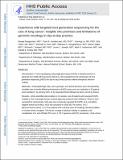| dc.contributor.author | Rangachari, Deepa | |
| dc.contributor.author | Vanderlaan, Paul A | |
| dc.contributor.author | Le, Xiuning | |
| dc.contributor.author | Folch, Erik E | |
| dc.contributor.author | Kent, Michael | |
| dc.contributor.author | Gangadharan, Sidhu | |
| dc.contributor.author | Majid, Adnan | |
| dc.contributor.author | Haspel, Richard Lawrence | |
| dc.contributor.author | Joseph, Loren Jay | |
| dc.contributor.author | Huberman, Mark S. | |
| dc.contributor.author | Costa, Daniel Botelho | |
| dc.date.accessioned | 2018-06-20T20:55:26Z | |
| dc.date.issued | 2015 | |
| dc.identifier | Quick submit: 2017-07-17T11:20:28-0400 | |
| dc.identifier.citation | Rangachari, Deepa, Paul A. VanderLaan, Xiuning Le, Erik Folch, Michael S. Kent, Sidharta P. Gangadharan, Adnan Majid, et al. 2015. “Experience with Targeted Next Generation Sequencing for the Care of Lung Cancer: Insights into Promises and Limitations of Genomic Oncology in Day-to-Day Practice.” Cancer Treatment Communications 4: 174–181. doi:10.1016/j.ctrc.2015.10.004. | en_US |
| dc.identifier.issn | 2213-0896 | en_US |
| dc.identifier.uri | http://nrs.harvard.edu/urn-3:HUL.InstRepos:37140911 | |
| dc.description.abstract | Introduction
Tumor genotyping using single gene assays (SGAs) is standard practice in advanced non-small-cell lung cancer (NSCLC). We evaluated how the introduction of next generation sequencing (NGS) into day-to-day clinical practice altered therapeutic decision-making.
Methods
Clinicopathologic data, tumor genotype, and clinical decisions were retrospectively compiled over 6 months following introduction of NGS assay use at our institution in 82 patient-tumor samples (7 by primary NGS, 22 by sequential SGAs followed by NGS, and 53 by SGAs).
Results
SGAs identified abnormalities in 34 samples, and all patients with advanced EGFR-mutated or ALK-rearranged tumors received approved tyrosine kinase inhibitors (TKIs) or were consented for clinical trials. NGS was more commonly requested for EGFR, ALK, and KRAS-negative tumors (p<0.0001). NGS was successful in 24/29 (82.7%) tumors. Of 17 adenocarcinomas (ACs), 11 (7 from patients with ≤15 pack-years of smoking) had abnormalities in a known driver oncogene. This led to a change in decision-making in 8 patients, trial consideration in 6, and off-label TKI use in 2. Of 7 squamous cell (SC) carcinomas, 1 had a driver aberration (FGFR1); 6 had other genomic events (all with TP53 mutations). In no cases were clinical decisions altered (p=0.0538 when compared to ACs).
Conclusions
Targeted NGS can identify a significant number of therapeutically-relevant driver events in lung ACs; particularly in never or light smokers. For SC lung cancers, NGS is less likely to alter current practice. Further research into the cost effectiveness and optimal use of NGS and improved provider training in genomic oncology are warranted. | en_US |
| dc.language.iso | en_US | en_US |
| dc.publisher | Elsevier BV | en_US |
| dc.relation.isversionof | 10.1016/j.ctrc.2015.10.004 | en_US |
| dc.relation.hasversion | https://www.ncbi.nlm.nih.gov/pmc/articles/PMC4653729/ | en_US |
| dash.license | OAP | |
| dc.subject | Non-small-cell lung cancer | en_US |
| dc.subject | adenocarcinoma | en_US |
| dc.subject | driver oncogene | en_US |
| dc.subject | next generation sequencing | en_US |
| dc.subject | squamous cell carcinomas | en_US |
| dc.subject | ALK | en_US |
| dc.subject | EGFR | en_US |
| dc.subject | MET | en_US |
| dc.subject | ROS1 | en_US |
| dc.subject | genotype | en_US |
| dc.title | Experience with targeted next generation sequencing for the care of lung cancer: Insights into promises and limitations of genomic oncology in day-to-day practice | en_US |
| dc.type | Journal Article | en_US |
| dc.date.updated | 2017-07-17T15:20:34Z | |
| dc.description.version | Accepted Manuscript | en_US |
| dc.relation.journal | Cancer Treatment Communications | en_US |
| dash.depositing.author | Vanderlaan, Paul A | |
| dc.date.available | 2015 | |
| dc.date.available | 2018-06-20T20:55:26Z | |
| dc.identifier.doi | 10.1016/j.ctrc.2015.10.004 | * |
| workflow.legacycomments | cat.complete | en_US |
| dash.authorsordered | false | |
| dash.contributor.affiliated | Haspel, Richard | |
| dash.contributor.affiliated | Joseph, Loren | |
| dash.contributor.affiliated | Folch, Erik | |
| dash.contributor.affiliated | Rangachari, Deepa | |
| dash.contributor.affiliated | Vanderlaan, Paul | |
| dash.contributor.affiliated | Gangadharan, Sidhu | |
| dash.contributor.affiliated | Majid, Adnan | |
| dash.contributor.affiliated | Kent, Michael | |
| dash.contributor.affiliated | Costa, Daniel | |


